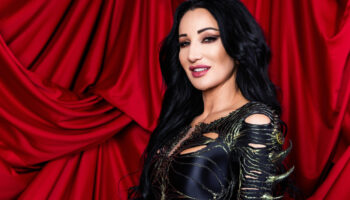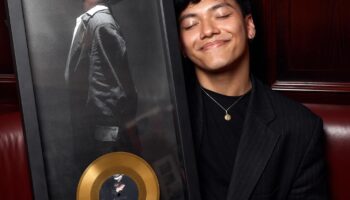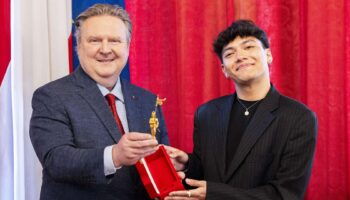This year marks the 50th anniversary of the 1964 Eurovision Song Contest when Copenhagen hosted the Eurovision Song Contet, the very first time the event was held on Scandinavian soil.
March, 1963. In London, young people were queuing up to buy the Beatles’ first LP, Please please me. In Paris, young people were humming along to Sheila’s hit L’école est finie on the radio. And in Copenhagen, two young people were being given a hero’s welcome when they landed on the tarmac of the city’s airport. Greta and Jørgen Ingmann had just won the Eurovision Song Contest for Denmark with their song Dansevise. It was the first Scandinavian win in the contest’s eight-year history.
It was like the time the football team returned after winning the European championship, Jørgen would later reminisce.
Fifty years on, in May 2013, another young person returned home to Copenhagen and to a hero’s welcome. Emmelie de Forest had secured a third victory for Denmark at the Eurovision Song Contest.
And so it is that in 2014, Copenhagen will host the Eurovision Song Contest once again. Fifty years after it first did so in 1964.
Much has changed in the world since Copenhagen’s first Eurovision on 21 March 1964. Much has changed in music. But in those fifty years, much has stayed the same about the Eurovision Song Contest.
Participating countries
Just like today, participating countries come in an out of the contest. This year, Bulgaria, Croatia, Cyprus and Serbia announced their withdrawal from the competition. And in 1963, Sweden did the same. The country’s musicians and singers went on strike over pay issues, precluding Sweden’s participation.
Portugal, however, made their debut in the contest. Antonio Calvario and his song Oração finished in last place, failing to earn a single point from any of that evening’s juries.
But it marked the first time the Portuguese language had been heard on a Eurovision stage. Fittingly for the fiftieth anniversary of Portugal’s first involvement, Portuguese will once again be heard on the Eurovision stage. After a year’s absence, Portugal has returned to the competition. Suzy Guerra will follow in the footsteps of Antonio Calvario and represent her country in Copenhagen.
Familiar faces
Participating countries come and go from the Eurovision Song Contest. And so do artists. This year, we’ll see the return to Eurovision of San Marino’s Valentina Monetta. It’ll be her third consecutive year in the competition. Also returning are Romania’s Paula Seling and Ovi, who were last took part in the competition back in 2010, and Russia’s Tolmachevy Twins will be seen again on a Eurovision stage eight years after they won the Junior Eurovision Song Contest in 2006.
Back in 1964, Swiss singer Anita Traversi represented her country for the second time at the Eurovision Song Contest. She’d first sung for Switzerland in 1964, where she finished in eighth position. Sadly for Anita, her second attempt in 1964 was less successful. She finished at the bottom of the scoreboard, and like Portugal’s Antonio Calvario, she didn’t receive any points at all.
Udo Jürgens made his Eurovision debut for Austria in 1964. Like Valentina Monetta, he’d go on to represent his country three times in consecutive years, finally winning the competition in 1966 with Adieu, chérie. It’s yet to be seen if it’ll also be third time lucky for Valentina Monetta.
The United Kingdom’s representative that year was the singer Matt Monro. During the 1950s, Monro had been a successful recording artist, and was well known in the UK as a vocalist for the BBC Show Band.
But the Eurovision Song Contest 1964 allowed Matt Monro to move his career up a gear. His song, I love the little things, finished in second place behind Italy’s Gigliola Cinquetti with Non ho l’età and exposed Matt Monro to a whole new audience. Within a year, he’d recorded his famous Born Free, and after another year, the hugely successful theme to the Bond film, From Russia with love. Matt Monro would also go on to record an English-language version of Udo Jürgens’ entry to the 1964 Eurovision Song Contest.
Fifty years on, the Eurovision stage in Copenhagen will be hosting many singers hoping to do like Matt Monro and build an international career from their more localised fame. Among them, for instance, is Spain’s Ruth Lorenzo.
Ruth Lorenzo has already known a degree of success as a contestant in the UK’s X Factor in 2008. She has since released singles with moderate success in the UK, and will be hoping that Copenhagen is her doorway to greater renown, just as it was fifty years ago for Matt Monro.
The figures
While popular in 1964, there can be no denying the Eurovision Song Contest has grown and grown in the years since.
The show was broadcast by DR, as it will be again this year. But rather than the three-hour extravaganza of the grand final in 2014, in 1964 the Eurovision Song Contest had only 16 competing acts and as such lasted only an hour and a half.
It’s estimated that around 100million viewers watched the 1964 contest, whereas this year, estimates start at about 300million. And while in 1964 the contest was held in Copenhagen’s Tivoli Gardens Concert Hall in front of 1, 500 spectators, this year’s contest will take place in front of about 15,000 in the city’s newly renovated B&W Hallerne.
The winner
Gigliola Cinquetti won the Eurovision Song Contest 1964 with the song Non ho l’età. Hers was a convincing victory, 32 points ahead of the UK’s Matt Monro.
The song reached the top 20 in charts across Europe including Italy, Belgium, Norway, the Netherlands, Germany and the UK. She went on to further Eurovision success ten years later in 1974 when she finished second to Abba and Waterloo when the contest was held in Brighton. And she more recently co-hosted the contest in 1991 when it was held in Rome.
Only time will tell what lies ahead for the winner of the Eurovision Song Contest 2014…
Gigliola Cinquetti in Copenhagen 1964 –




